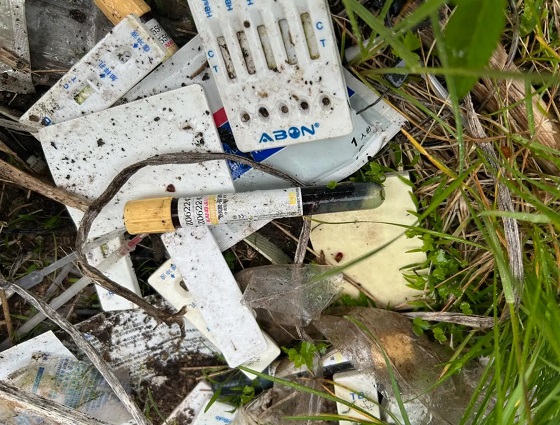2025 Federal Election
PRC-Linked Disinformation Claims Conservatives Threaten Chinese Diaspora Interests, Take Aim at PM Carney’s Debate Remark

As polls tighten in Canada’s pivotal federal election, a Chinese-language website has published multiple editorials suggesting that a Pierre Poilievre government could threaten Chinese Canadian interests with so-called “anti-China” policy clauses—claiming it could bring “inconvenience to the lives of Chinese people, such as restrictions on the use of social media, reductions in return air tickets, etc.”
During the 2021 federal election, then-Conservative leader Erin O’Toole and MP Kenny Chiu were widely attacked with similar arguments across Chinese-language news and social media. CSIS reporting from 2022, cited exclusively by The Bureau, warned that Chinese-language media in Canada is effectively controlled by Beijing and weaponized during election periods to spread Chinese Communist Party-aligned narratives.
One of the new articles also criticizes Prime Minister Mark Carney’s debate remark that Beijing poses the greatest threat to Canada’s national security—a comment that prompted the Chinese-language editorial to question whether Carney’s statement was “a gimmick to attract attention.”
The articles, published Thursday and Friday by 51.ca, have raised deep concern among some community members. One longtime Chinese Canadian journalist, who requested anonymity due to fear of retaliation, told The Bureau they were alarmed by the messaging and suspected the coverage was driven by election-interference motives.
One of the pieces claimed that “the Conservative Party has written anti-China clauses into the party platform,” referencing a prior story that quickly circulated on Chinese-language social media and triggered fearful discussion.
Citing WeChat commentary on the same article, the journalist pointed specifically to a politically connected figure previously associated with CSIS investigations into election interference networks in the Greater Toronto Area—allegedly tied to clandestine funding channels linked to the Chinese Consulate in Toronto.
Sharing a WeChat forum screen-picture, the diaspora journalist noted:
“The writer said, according to the Conservative’s campaign platform, China’s definition is ‘enemy.’ So what is the impact on Chinese Canadians’ daily life? Facing more discrimination? Fewer flights going back to China? How about using social media? If there is a war, what will happen to Chinese Canadians—like Japanese people were sent to the concentration camps or deported?”
The journalist said the messaging is not only inflammatory, but dangerously manipulative—casting the Conservative Party as a threat to the civil rights and safety of Chinese Canadians, while exploiting historical trauma to provoke fear.
The same 51.ca article—while quoting from the Conservative Party’s platform documents—shifts sharply into misleading commentary. It contrasts the party’s current positions with historical discrimination enacted by the Liberal government of the 1920s.
One of the recent 51.ca articles warns that the Conservative Party’s stance “can easily cause ethnic tensions and even exacerbate anti-China sentiment.”
A second article delivers a similar critique of Conservative policy while also taking aim at Prime Minister Mark Carney, who, in last night’s nationally televised debate, stated:
“I think the biggest security threat to Canada is China.”
That comment, consistent with assessments from Canadian intelligence services and allied Five Eyes partners, was immediately seized upon by 51.ca’s editorial board.
“Carney blurted out that China is Canada’s biggest threat. Is this a deep-rooted idea or a gimmick to attract attention? It is not known yet. But what is certain is that when other party leaders are talking about how to deal with the problems facing Canada itself, Carney is talking about China being the enemy. I really don’t know what’s going on in his mind.”
Both 51.ca articles strategically focus their sharpest criticism on the Conservative Party, portraying its platform as existentially dangerous, while the second treats Carney’s one-line debate comment as a moment of rhetorical overreach.
The Bureau is a reader-supported publication.
To receive new posts and support my work, consider becoming a free or paid subscriber.
Invite your friends and earn rewards
2025 Federal Election
NDP’s collapse rightly cost them official party status

This article supplied by Troy Media.
 By Michael Taube
By Michael Taube
Official party status requires 12 seats. The NDP got seven. End of story
Rules are rules.
That, in a nutshell, is why the NDP wasn’t granted official party status in the House of Commons on Monday. Prime Minister Mark Carney and the
Liberals, to their credit, made the right decision.
Let’s examine why.
The 1963 Senate and House of Commons Act passed an amendment that gave an annual allowance to party leaders other than the prime minister and
leader of the Opposition. In doing so, the Canadian government had to establish what constitutes a “political party.” The definition they came up with was a sensible one: it had to have a “recognized membership of 12 or more persons in the House of Commons.”
This important amendment is still used today.
The NDP fell from 24 to a paltry seven seats in last month’s federal election. (There are a total of 343 seats in the House of Commons.) They finished with 1,234,673 votes, or 6.29 per cent, which was behind the Liberals, Conservatives and Bloc Québécois. Party leader Jagmeet Singh, who had represented the former Burnaby South riding since 2019, finished a distant third in the newly created Burnaby Central riding and resigned.
The NDP’s seven seats is well below the 12-seat requirement needed for official party status. This means Canada’s socialist alternative won’t be able to ask questions in the House of Commons and will lose out on money for research purposes.
Or, to put it another way, they’re plumb out of luck.
Hold on, some people said. They pointed out that the NDP’s seat count and popular vote only plummeted because many progressive voters backed Carney and the Liberals as the best option to counter U.S. President Donald Trump and his tariffs. They felt that the NDP’s long history as a champion for unions and the working class should count for something. They suggested there should be an exception to the rule.
Guess what? They’re wrong.
This is the worst election result in the party’s history. Even its predecessor, the Co-operative Commonwealth Federation (CCF), did marginally better in its first campaign. The CCF won seven out of 245 seats—and earned 410,125 votes, or 9.31 per cent—in the 1935 election. Party leader J.S. Woodsworth, who had represented the riding of Winnipeg North Centre as an Independent Labour MP since 1925, comfortably held his seat.
Meanwhile, this won’t be the first time they’ve ever lost official party status.
The NDP dropped from 43 to nine seats in the 1993 election. It was a dismal showing, to say the least. There was a suggestion at the time that then-party leader Audrey McLaughlin, the first woman to lead a party with political representation in Canada’s House of Commons, deserved a better fate. While the NDP certainly came closer to achieving the 12-seat requirement in this particular election, Prime Minister Jean Chrétien and the Liberals decided against granting them official party status.
Why? As I mentioned earlier, rules are rules.
Then again, British pilot Harry Day notably told his fellow flying ace Douglas Bader in 1931, “You know my views about some regulations—they’re written for the obedience of fools and the guidance of wise men.”
Does this mean that individuals and organizations who follow rules are, in fact, fools? Not at all. While certain rules in a liberal democratic society can range from slightly questionable to utterly ridiculous, they’re usually put in place for a specific purpose.
In the case of the House of Commons, it’s to ensure that a bar has been set with respect to political representation. Is 12 seats the right number? That’s difficult to say. It certainly prevents small protest parties and one-issue parties that unexpectedly win a tiny number of seats in an election from acquiring power and status right off the bat. They need to win more seats and grow in size and stature to reach a point of respectability. Most of them never reach this point and disappear while others float in a constant state of mediocrity like the Green Party of Canada. ’Tis the nature of the political beast.
One final point. If Singh and the NDP had reached double digits in total number of seats in 2025, a solid case could have been made in favour of official party status. If they had finished with 11 seats, it would have almost been a lock. Neither scenario ultimately materialized, which is why Carney and the Liberals did exactly what they did.
Michael Taube is a political commentator, Troy Media syndicated columnist and former speechwriter for Prime Minister Stephen Harper. He holds a master’s degree in comparative politics from the London School of Economics, lending academic rigour to his political insights.
Troy Media empowers Canadian community news outlets by providing independent, insightful analysis and commentary. Our mission is to support local media in helping Canadians stay informed and engaged by delivering reliable content that strengthens community connections and deepens understanding across the country.
2025 Federal Election
Judicial recounts give Conservatives 2 more seats, keeping Liberals short of majority

From LifeSiteNews
After a judicial recount, Conservative candidate Kathy Borrelli has officially won over Liberal incumbent Irek Kusmierczyk, in the Ontario riding of Windsor-Tecumseh-Lakeshore.
Judicial recounts from the 2025 federal election have given the Conservative Party two new seats, with one candidate winning by just four votes.
After a judicial recount, Conservative candidate Kathy Borrelli has officially won over Liberal incumbent Irek Kusmierczyk, in the Ontario riding of Windsor-Tecumseh-Lakeshore.
Borrelli got 32,090 votes, with Kusmierczyk getting 32,086 votes, and NDP candidate Alex Ilijoski getting 4,240 votes.
In the Newfoundland riding of Terra Nova-The Peninsulas, Conservative candidate Jonathan Rowe beat out Liberal Anthony Germain by just 12 votes after a recount with the initial result showing a Liberal victory.
The new election results mean the Conservatives now have 144 seats with the Liberals at 169, three short of a majority.
Judicial recounts are automatically triggered when the margin of victory for a candidate is less than 0.1 percent of valid votes.
While these recounts have favored the Conservatives, others have gone in the Liberal Party’s favor.
A May 16 judicial recount switched the southern Ontario riding of Milton East-Halton Hills South to the Liberals with a 21-vote victory over the Conservatives.
Overall, the election results have been a big blow to the Conservative Party, which on top of losing the election also saw its leader, Pierre Poilievre, fail to win his long-held seat. However, Poilievre is expected to run in a yet-to-be-announced by-election in Alberta to reclaim a seat in Parliament.
-

 Immigration2 days ago
Immigration2 days agoUnregulated medical procedures? Price Edward Islanders Want Answers After Finding Biomedical Waste From PRC-Linked Monasteries
-

 Business2 days ago
Business2 days agoDemocracy Watchdog Says PM Carney’s “Ethics Screen” Actually “Hides His Participation” In Conflicted Investments
-

 Addictions2 days ago
Addictions2 days agoAfter eight years, Canada still lacks long-term data on safer supply
-

 Bruce Dowbiggin1 day ago
Bruce Dowbiggin1 day agoHow Did PEI Become A Forward Branch Plant For Xi’s China?
-

 COVID-191 day ago
COVID-191 day agoJapan disposes $1.6 billion worth of COVID drugs nobody used
-

 National2 days ago
National2 days agoLiberals push to lower voting age to 16 in federal elections
-

 International12 hours ago
International12 hours agoThis ends now: Trump orders Bondi to unseal Epstein grand jury testimony
-

 Alberta1 day ago
Alberta1 day agoUpgrades at Port of Churchill spark ambitions for nation-building Arctic exports







